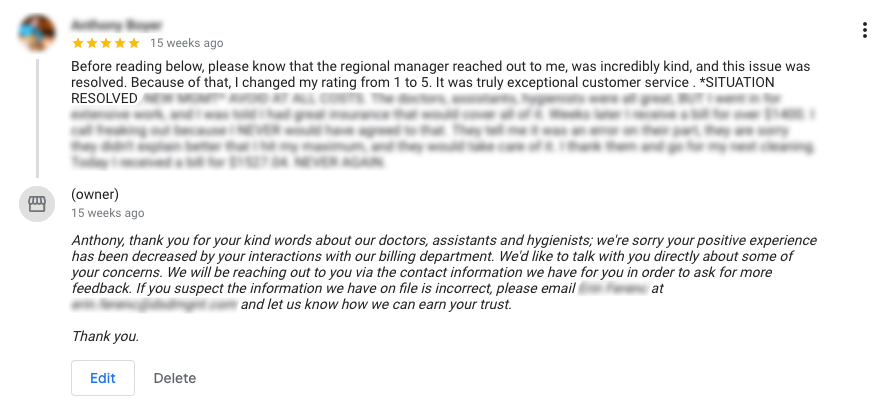Why Reviews Matter (And What To Do If You Get A Bad One)
 Across any industry, one of the best and easiest ways to win new business is through a referral. Today a referral might not involve a client or customer talking to their direct network. Instead, referrals are spread digitally through reviews. Reviews give each customer or client exponentially more power over your brand, reaching broader audiences and having their opinions visible for longer periods of time.
Across any industry, one of the best and easiest ways to win new business is through a referral. Today a referral might not involve a client or customer talking to their direct network. Instead, referrals are spread digitally through reviews. Reviews give each customer or client exponentially more power over your brand, reaching broader audiences and having their opinions visible for longer periods of time.
For this reason, I’m not surprised when a client questions whether or not they should claim their business on Google or create social media pages. The fear of a negative review is completely understandable.
But hang in there.
Claiming your profile on social, search, and directories is still good for your business. And a bad review doesn’t have to feel like a punishment or the end of the world.
Let’s start with some reasons why you should claim or create profiles:
1. Claiming your business on directories and search platforms is good for your Search Engine Optimization (SEO).
Claiming your business on various directories gives you the opportunity to ensure your NAP information (name, address, phone number) is consistent across the web. NAP consistency is important, especially for local SEO, because it makes it easier for search engines to understand who you are, what you do, and how people can reach you. It improves your ability to appear in searches when people are looking for companies like yours in your area.
2. Claiming your business on social platforms might be good for your SEO.
Google has flip-flopped on its position regarding social media’s factor in rankings: in earlier years they said it was, and now they are saying it is not. However, research suggests that there is at least a correlation between social shares and your content’s rank, and social profiles still rank on search engine results pages (SERP).
Additionally, Google has the tendency to tweak its algorithm frequently (sometimes to the tune of multiple times in a month.) It wouldn’t surprise me in the least if Google reversed its reversal on social signals as a ranking factor some time in the future, and I believe it will pay to continue to invest in your company profile in the meantime.
Bing, meanwhile, has definitively declared they use social signals as ranking factors. While their market share goes up and down (6.34% in the U.S. at the time of this article, though that does not include searches through yahoo or msn), they remain a platform to watch.
3. Reviews are an asset. (Even negative reviews.)
When managed well, reviews are an asset for your business. They send signals to your future customers, partners, and job applicants regarding your trustworthiness and culture. In fact, according to a 2018 survey, 86% of consumers read reviews for local businesses and 57% of consumers will only use a business if it has 4 or more stars. Good reviews are similar to good referrals in that people who aren’t on your payroll are saying good things about you.
Even bad reviews are an asset. While it’s more comfortable to believe that everyone who leaves a bad review either has unrealistic expectations or is just “crazy,” the reality is that they might be giving you insight into something that might be broken in your operations or in your product or service. Only about 4% of your dissatisfied customers will let you know about their complaint, meaning most unhappy clients will simply stop using your products or services without saying anything to you.
Paying attention to bad reviews can help you fix a problem that has bothered silent clients and customers.
Bad reviews are also an asset because they give you a chance to win back that customer by responding well to their complaint. (This will also show future customers how your company handles complaints, or potentially educate them in cases where the reviewer got details wrong.) When handled well, customers have shown they are willing to return to a business in the future.
Reviewers have also been known to update their review if the company works with them to resolve their complaint. We saw this just recently with one of our clients who received a negative review regarding one of their processes. We were able to quickly alert them to the review, advise them on a response, and celebrate with them when the review was changed through their efforts:

Now, not only is this client’s relationship restored, but he switched from criticizing the company to actually recommending it.
How you or your company responds to negative reviews will be completely contextual: your brand’s personality, the complaint, and your ability to fix the issue are all factors. The key is to respond quickly and with direction on how to work toward a resolution. This is where we can help: we work with clients to claim their businesses on various directories, monitor for reviews, and form responses to help turn complaints into approval. Ask us about our NAP and directories listing management via our Contact Form or give us a call at 717-569-8274. Not ready yet? Check out some of the other things we can do for your organization through digital marketing.
For more articles about marketing, public relations, and taking your brand further, click the button below to subscribe to our monthly newsletter.
